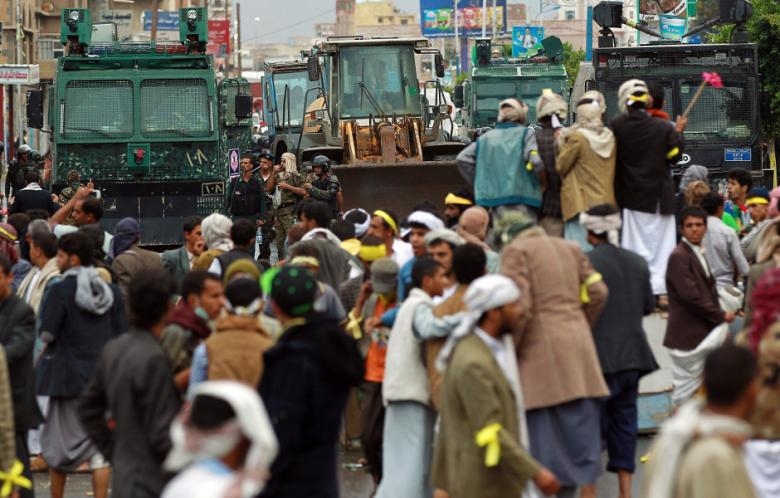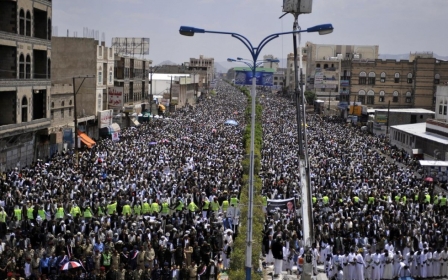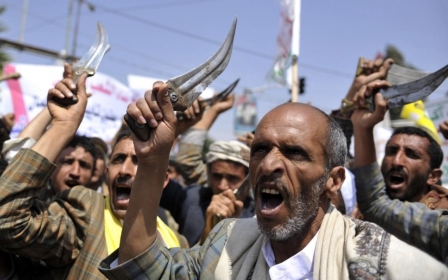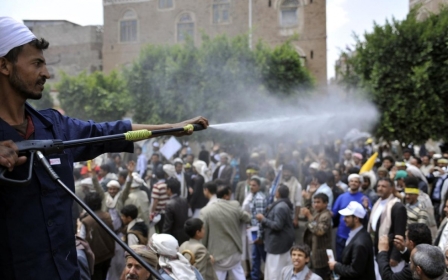Negotiations in Yemen break down amid claims of a proxy war

Negotiations between Houthi rebels and the Yemeni government are “frozen”, according to a statement from the Houthi spokesperson on Monday morning.
The Ansarullah movement, composed mostly of rebels from the Houthi tribe, has been organising protests and encampments in the capital Sana’a for almost a month, calling publicly for the dissolution of the current government and the return of fuel subsidies.
Houthi spokesperson Mohammed Abdel Salaam told Yemeni daily al-Oulaye that, though President Mansour had signed off on a draft agreement between the two sides, talks have now broken down.
In his statement, he condemned the “intervention” of UN Special Adviser on Yemen Jamal Benomar, who has been mediating the talks, and the G10.
A group of G10 ambassadors, including representatives from the UK, the US, France and Japan, warned in a press release issued on Saturday that the Houthis were responsible for “the deterioration of the security situation in Sana’a.”
On Sunday, the Houthis said that the statement had returned negotiations to “square one”, and by Monday their spokesperson accused the G10 ambassadors of attempting to give the talks “an international dimension based on the Gulf Initiative and the UN Security Council.”
The UN Security Council accused Houthis in late August of attempting to “undermine the country’s political transition.”
Benomar, who is now leading negotiations between Houthis and the government, said at the time that the council wanted to send a “strong message” to the Houthis.
‘Battle-ground in the conflict between Iran and Saudi Arabia’
In a further sign that negotiations have broken down, an official from the government’s negotiating team told al-Jazeera that the rebels have “other demands” that they are not announcing publicly.
Accusing the Houthis of attempting to establish control of the country “by force”, Abdel Aziz Jabari also alleged that Iran is playing a role in backing the supporters of the Ansarullah movement, most of whom are Shiites from the minority Zaidi sect.
He called on Saudi Arabia to intervene and prevent the fall of the Yemeni state.
“Unfortunately, Yemen has become a battle-ground in the conflict between Iran and Saudi Arabia. We are paying the price for this struggle.”
Saleh turns against Houthis
In a blow for the Houthis, former President of Yemen Abdullah Saleh publicly criticised the movement for the first time.
“Sana’a is a capital for all Yemenis…don’t block the streets and set up encampments on the roads.
“Resorting to violence and terrorism will not bring safety and stability to this country.”
Saleh, who stepped aside as president in 2011 after months of popular protest, has frequently been accused of supporting the Houthis, reports Arabic news site al-Arabiya.
Deteriorating situation outside the capital
Three quarters of the schools in al-Jawf province, just north-east of the Sana’a governorate, are closed due to an ongoing war between Houthi rebels and tribesmen fighting alongside the government.
Yemen’s education ministry in the province said on Monday that education throughout the province is “virtually paralysed”, and that large numbers of people, including teachers, have fled the ongoing war.
A presidential commission arrived in the province on Monday to investigate a bombing by government forces that killed a civilian and injured seven others in al-Jawf on Sunday.
Middle East Eye propose une couverture et une analyse indépendantes et incomparables du Moyen-Orient, de l’Afrique du Nord et d’autres régions du monde. Pour en savoir plus sur la reprise de ce contenu et les frais qui s’appliquent, veuillez remplir ce formulaire [en anglais]. Pour en savoir plus sur MEE, cliquez ici [en anglais].




